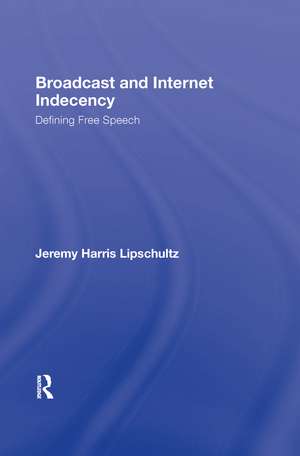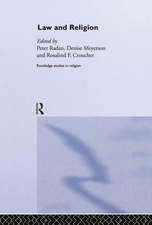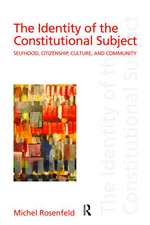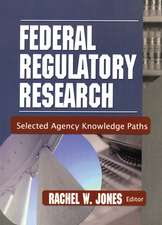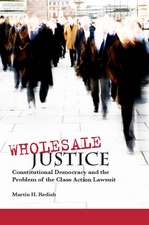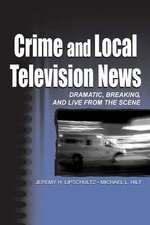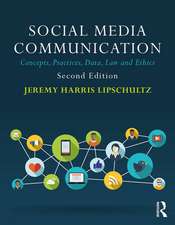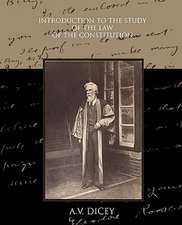Broadcast and Internet Indecency: Defining Free Speech: Routledge Communication Series
Autor Jeremy Lipschultzen Limba Engleză Hardback – 14 dec 2007
Din seria Routledge Communication Series
- 9%
 Preț: 575.55 lei
Preț: 575.55 lei - 9%
 Preț: 576.44 lei
Preț: 576.44 lei -
 Preț: 155.44 lei
Preț: 155.44 lei - 8%
 Preț: 495.23 lei
Preț: 495.23 lei - 8%
 Preț: 417.13 lei
Preț: 417.13 lei - 15%
 Preț: 404.22 lei
Preț: 404.22 lei -
 Preț: 392.97 lei
Preț: 392.97 lei - 8%
 Preț: 516.78 lei
Preț: 516.78 lei -
 Preț: 171.85 lei
Preț: 171.85 lei - 8%
 Preț: 509.91 lei
Preț: 509.91 lei - 8%
 Preț: 460.12 lei
Preț: 460.12 lei - 8%
 Preț: 394.36 lei
Preț: 394.36 lei -
 Preț: 424.75 lei
Preț: 424.75 lei - 15%
 Preț: 431.10 lei
Preț: 431.10 lei -
 Preț: 364.94 lei
Preț: 364.94 lei -
 Preț: 363.96 lei
Preț: 363.96 lei - 25%
 Preț: 325.34 lei
Preț: 325.34 lei - 15%
 Preț: 463.49 lei
Preț: 463.49 lei - 15%
 Preț: 467.42 lei
Preț: 467.42 lei -
 Preț: 366.85 lei
Preț: 366.85 lei -
 Preț: 264.53 lei
Preț: 264.53 lei - 16%
 Preț: 247.75 lei
Preț: 247.75 lei -
 Preț: 354.28 lei
Preț: 354.28 lei -
 Preț: 374.27 lei
Preț: 374.27 lei - 22%
 Preț: 321.54 lei
Preț: 321.54 lei -
 Preț: 421.07 lei
Preț: 421.07 lei -
 Preț: 481.52 lei
Preț: 481.52 lei -
 Preț: 442.50 lei
Preț: 442.50 lei -
 Preț: 498.91 lei
Preț: 498.91 lei -
 Preț: 369.95 lei
Preț: 369.95 lei - 24%
 Preț: 133.28 lei
Preț: 133.28 lei - 31%
 Preț: 325.43 lei
Preț: 325.43 lei - 30%
 Preț: 769.37 lei
Preț: 769.37 lei -
 Preț: 447.05 lei
Preț: 447.05 lei - 18%
 Preț: 722.88 lei
Preț: 722.88 lei -
 Preț: 389.60 lei
Preț: 389.60 lei -
 Preț: 249.75 lei
Preț: 249.75 lei -
 Preț: 395.37 lei
Preț: 395.37 lei -
 Preț: 363.96 lei
Preț: 363.96 lei - 18%
 Preț: 1004.72 lei
Preț: 1004.72 lei - 18%
 Preț: 998.71 lei
Preț: 998.71 lei -
 Preț: 380.22 lei
Preț: 380.22 lei - 26%
 Preț: 243.26 lei
Preț: 243.26 lei -
 Preț: 102.17 lei
Preț: 102.17 lei -
 Preț: 242.11 lei
Preț: 242.11 lei - 20%
 Preț: 402.68 lei
Preț: 402.68 lei -
 Preț: 226.33 lei
Preț: 226.33 lei -
 Preț: 386.14 lei
Preț: 386.14 lei -
 Preț: 241.09 lei
Preț: 241.09 lei - 18%
 Preț: 961.37 lei
Preț: 961.37 lei
Preț: 247.97 lei
Preț vechi: 307.44 lei
-19% Nou
Puncte Express: 372
Preț estimativ în valută:
47.45€ • 51.53$ • 39.86£
47.45€ • 51.53$ • 39.86£
Carte tipărită la comandă
Livrare economică 22 aprilie-06 mai
Preluare comenzi: 021 569.72.76
Specificații
ISBN-13: 9780805859096
ISBN-10: 0805859098
Pagini: 424
Dimensiuni: 152 x 229 mm
Greutate: 0.79 kg
Ediția:New.
Editura: Taylor & Francis
Colecția Routledge
Seria Routledge Communication Series
Locul publicării:Oxford, United Kingdom
ISBN-10: 0805859098
Pagini: 424
Dimensiuni: 152 x 229 mm
Greutate: 0.79 kg
Ediția:New.
Editura: Taylor & Francis
Colecția Routledge
Seria Routledge Communication Series
Locul publicării:Oxford, United Kingdom
Cuprins
Table of Contents
Broadcast & Internet Indecency: Defining Free Speech
Chapter I. Introduction to Broadcast and Internet Indecency
The Engaging Questions
Stern Helps Define the Issues
Social and Legal Issues
Miller v. California
Broadcasting, Cable and the Internet
Safe Harbor Issues
To Regulate or Not
Indecency and Obscenity
Chapter Summary
Review Questions
Chapter II. History of American Broadcasting
Historical Context of Broadcast Regulation
Ship-to-Shore Communications and Interference Chaos
NBC
Red Lion
Public Interest, Convenience and Necessity
Newton Minnow Calls Television in 1961 a ÒVast WastelandÓ
The Highpoint of Regulation
Deregulation, FCC Policy Statements and Congressional Responses
Data and Processes
Parental Control or Government Control
TV Watch Study Finds Opposition to Current FCC Regulation
Chapter Summary
Review Questions
Chapter III. Theory and Research in Broadcast and Internet Indecency
Normative First Amendment Theories
Douglas’ Near-absolutist View
Strict Scrutiny
Theories of FCC and FTC Regulation
Legal Analyses
Carlin Monologue as Transcribed by Pacifica Court
Social and Psychological Research
Social Theory and Computer-Mediated Communication
Chapter Summary
Review Questions
Chapter IV. Adult Entertainment
The Pornography Business
Girls Gone Wild Video Producer Guilt of Exploiting Children
Media Law on Pornography
Zoning and the Law
Pay Cable Channels
Satellite Radio and Television
X-rated Moviews
Chapter Summary
Review Questions
Chapter V. The Legacy of Pacifica and the Action for Children’s Television Cases
A Single Complaint
Political Implications of the Indecency Ban
FCC Order and the Diaz Statement
Dial-a-Porn: Sabe Communications
Decision and Reasoning
ACT I
ACT II
ACT III
Interpretations of the Opinion
Political Generalizations
Developments
Political Implications
Politics of Broadcast Regulation
Chapter Summary
Review Questions
Chapter VI. Cable Television, New Technologies and New Definitions
First Amendment Rights
The First Amendment and Cyberspace
Non-broadcast Video Options
Appendix to the Opinion of the Court
Satellite Issues
Digital Television
The Internet
Indecency, Obscenity and the New Media World
Chapter Summary
Review Questions
Chapter VII. New Media Issues
Cultural Concerns about Indecency
Computer-Mediated Communication
Mancow Thrives in Post-indecency Complaint Career
Other Internet Issues: YouTube
Fox Shows F-word During Playoff Game
Libel, Privacy and Copyright
Chapter Summary
Review Questions
Chapter VIII. The Fight Over Indecent Content
Indecent Content and the FCC
The Special Case of the Super Bowl
Explicit Podcasting
Chapter Summary
Review Questions
Chapter IX. Political and Religious Issues
The Politics of Regulation
Religious Concerns
Religion, Washington and Indecency
Congressman Fred Upton Seeks to Have Broadcasters Think Twice
NBC Show Las Vegas Draws AFA Complaints
Impact of a Crackdown
A Market for Religion
Faith in a Box Study
Chapter Summary
Review Questions
Chapter X. Trends: Fines, Enforcement, Laws and Regulation
FCC Tells the Public About Indecency Regulation
Regulation of Obscenity, Indecency and Profanity
Frequently Asked Questions
How to File a Complaint
FCC Lawyer Challenged by Second Circuit Court of Appeals Panel
Raising the Broadcast Fines
Internet Freedoms
SNL Censored Skit Plays on YouTube
Projections
Implications for Defining Free Expression
Chapter Summary
Review Questions
References
Appendix A
Appendix B
Appendix C
Appendix D
Appendix E
Appendix F
Author Index
Subject Index
Broadcast & Internet Indecency: Defining Free Speech
Chapter I. Introduction to Broadcast and Internet Indecency
The Engaging Questions
Stern Helps Define the Issues
Social and Legal Issues
Miller v. California
Broadcasting, Cable and the Internet
Safe Harbor Issues
To Regulate or Not
Indecency and Obscenity
Chapter Summary
Review Questions
Chapter II. History of American Broadcasting
Historical Context of Broadcast Regulation
Ship-to-Shore Communications and Interference Chaos
NBC
Red Lion
Public Interest, Convenience and Necessity
Newton Minnow Calls Television in 1961 a ÒVast WastelandÓ
The Highpoint of Regulation
Deregulation, FCC Policy Statements and Congressional Responses
Data and Processes
Parental Control or Government Control
TV Watch Study Finds Opposition to Current FCC Regulation
Chapter Summary
Review Questions
Chapter III. Theory and Research in Broadcast and Internet Indecency
Normative First Amendment Theories
Douglas’ Near-absolutist View
Strict Scrutiny
Theories of FCC and FTC Regulation
Legal Analyses
Carlin Monologue as Transcribed by Pacifica Court
Social and Psychological Research
Social Theory and Computer-Mediated Communication
Chapter Summary
Review Questions
Chapter IV. Adult Entertainment
The Pornography Business
Girls Gone Wild Video Producer Guilt of Exploiting Children
Media Law on Pornography
Zoning and the Law
Pay Cable Channels
Satellite Radio and Television
X-rated Moviews
Chapter Summary
Review Questions
Chapter V. The Legacy of Pacifica and the Action for Children’s Television Cases
A Single Complaint
Political Implications of the Indecency Ban
FCC Order and the Diaz Statement
Dial-a-Porn: Sabe Communications
Decision and Reasoning
ACT I
ACT II
ACT III
Interpretations of the Opinion
Political Generalizations
Developments
Political Implications
Politics of Broadcast Regulation
Chapter Summary
Review Questions
Chapter VI. Cable Television, New Technologies and New Definitions
First Amendment Rights
The First Amendment and Cyberspace
Non-broadcast Video Options
Appendix to the Opinion of the Court
Satellite Issues
Digital Television
The Internet
Indecency, Obscenity and the New Media World
Chapter Summary
Review Questions
Chapter VII. New Media Issues
Cultural Concerns about Indecency
Computer-Mediated Communication
Mancow Thrives in Post-indecency Complaint Career
Other Internet Issues: YouTube
Fox Shows F-word During Playoff Game
Libel, Privacy and Copyright
Chapter Summary
Review Questions
Chapter VIII. The Fight Over Indecent Content
Indecent Content and the FCC
The Special Case of the Super Bowl
Explicit Podcasting
Chapter Summary
Review Questions
Chapter IX. Political and Religious Issues
The Politics of Regulation
Religious Concerns
Religion, Washington and Indecency
Congressman Fred Upton Seeks to Have Broadcasters Think Twice
NBC Show Las Vegas Draws AFA Complaints
Impact of a Crackdown
A Market for Religion
Faith in a Box Study
Chapter Summary
Review Questions
Chapter X. Trends: Fines, Enforcement, Laws and Regulation
FCC Tells the Public About Indecency Regulation
Regulation of Obscenity, Indecency and Profanity
Frequently Asked Questions
How to File a Complaint
FCC Lawyer Challenged by Second Circuit Court of Appeals Panel
Raising the Broadcast Fines
Internet Freedoms
SNL Censored Skit Plays on YouTube
Projections
Implications for Defining Free Expression
Chapter Summary
Review Questions
References
Appendix A
Appendix B
Appendix C
Appendix D
Appendix E
Appendix F
Author Index
Subject Index
Recenzii
"Broadcast and Internet indecency are fascinating areas of research. The issue of whether offensive speech that isn't legally obscene should be regulated has captured the interest of numerous legal scholars since the 1970s. In this book, Jeremy Lipschultz explores indecency from legal, social and theoretical perspectives. This alone makes this work an important contribution to the discourse of freedom of speech, especially "offensive" speech.
Those of us who have studied the regulation of indecency know that this subject can become clouded by self-righteousness and politics. I welcome Jeremy Lipschultz's effort to bring such a broad range of approaches into the study of indecency regulation. He certainly has done a great deal of work in this area and this book allows him to put it all together into a coherent and meaningful whole."
Milagros Rivera Sanchez
Chair, Communications and New Media Program
National University of Singapore
Those of us who have studied the regulation of indecency know that this subject can become clouded by self-righteousness and politics. I welcome Jeremy Lipschultz's effort to bring such a broad range of approaches into the study of indecency regulation. He certainly has done a great deal of work in this area and this book allows him to put it all together into a coherent and meaningful whole."
Milagros Rivera Sanchez
Chair, Communications and New Media Program
National University of Singapore
Notă biografică
Jeremy Lipschultz (Ph.D., Southern Illinois University) is the Reilly Professor and Interim Director, School of Communication, University of Nebraska at Omaha. He has written several books on related topics (Broadcast Indecency: F.C.C. Regulation and the First Amendent (Focal Press, 1997) and Free Expression in the Age of the Internet: Social and Legal Boundaries (Westview Press, 2000). He writes the New Communications Technology chapter each year for Wat Hopkins' textbook Communication and the Law (Vision Press, 2005). Lipschultz is co-author of Crime and Local TV News: Dramatic, Breaking and Live from the Scene (LEA, 2002), and Mass Media, an Aging Population and the Baby Boomers (forthcoming). He has written numberous scholarly articles in refereed publications such as Journalism & Mass Communication Quarterly, Journalism & Mass Communication Educator, Journal of Broadcasting & Electronic Media, Educational Gerontology, Journal of Social Behavior and Personality, Journal of Radio Studies, Newpaper Research Journal, Studies in Media & Information Literacy.
Descriere
This book explores broadcast and Internet indecency from social and legal perspectives, using current cases and examples. Case law is used as a starting point from which to explore the social and legal boundaries of speech. Lipschultz argues that broadcast and Internet indecency reflect the outer boundaries of acceptable speech, and "understanding the limits of free speech in a free society allows us to theorize about the nature of communication." With indecency in the news every week, this volume is likely to get much critical and popular attention in the media discipline.
